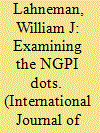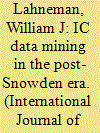| Srl | Item |
| 1 |
ID:
124002


|
|
|
|
|
| Publication |
2013.
|
| Summary/Abstract |
National intelligence is still organized around the collection disciplines of the home agencies, not the joint mission. The importance of integrated, all-source analysis cannot be overstated. Without it, it is not possible to "connect the dots." No one component holds all the relevant information.
The 9/11 Commission Report, 22 July 2004, p. 408.
Although the 9/11 Commission Report 1 is over 400 pages long, its catchphrase about the Intelligence Community's (IC's) failure to "connect the dots" most succinctly captures one of the principal things that went wrong with the U.S government's efforts in general, and the IC's attempts in particular, to detect al-Qaeda's attack plans. General agreement prevails that the chance of detecting al-Qaeda's plans would have been improved if the IC had been able to pool, fuse, and analyze all of the relevant information about al-Qaeda's plans that various U.S. government agencies possessed prior to the attacks. As a result, the Commission strongly emphasized the need to improve information sharing across multiple IC and other government agencies to improve the IC's chances of detecting future attacks.
|
|
|
|
|
|
|
|
|
|
|
|
|
|
|
|
| 2 |
ID:
155217


|
|
|
|
|
| Summary/Abstract |
This article discusses the use of experiential (or active) learning methods – specifically the use of simulations, exercises, and games – to enhance student learning in intelligence courses at universities to prepare students for careers in intelligence organizations. The article argues that most disciplines and academic fields employ laboratories, simulations, internships, and practical exercises when the learning objective is to develop the required skills to successfully practice a professional discipline. The use of active learning techniques challenges prospective intelligence professionals to learn by exercising previously learned concepts, frameworks, and tools in simulated ‘real world’ scenarios, leading them to gradually become more technically skillful and effective.
|
|
|
|
|
|
|
|
|
|
|
|
|
|
|
|
| 3 |
ID:
146420


|
|
|
|
|
| Summary/Abstract |
Henry Stimson spoke those now famous words to explain his reason for eliminating the Cipher Bureau, the code breaking organization that had been operating under joint State Department—Department of War sponsorship since the end of World War I. The Cipher Bureau, a legacy organization of the U.S. Army's Cryptologic Service, had distinguished itself during the war in providing important intelligence obtained by breaking foreign diplomatic and military codes and ciphers. During the interwar years, the Cipher Bureau was able to break the diplomatic codes of several nations. Incidentally, that ability to intercept foreign communications was possible only through the secret and illegal cooperation of the entire American cable industry, which operated the transoceanic underwater cables that constituted the leading edge long-range communications technology of that era.
|
|
|
|
|
|
|
|
|
|
|
|
|
|
|
|
| 4 |
ID:
095862


|
|
|